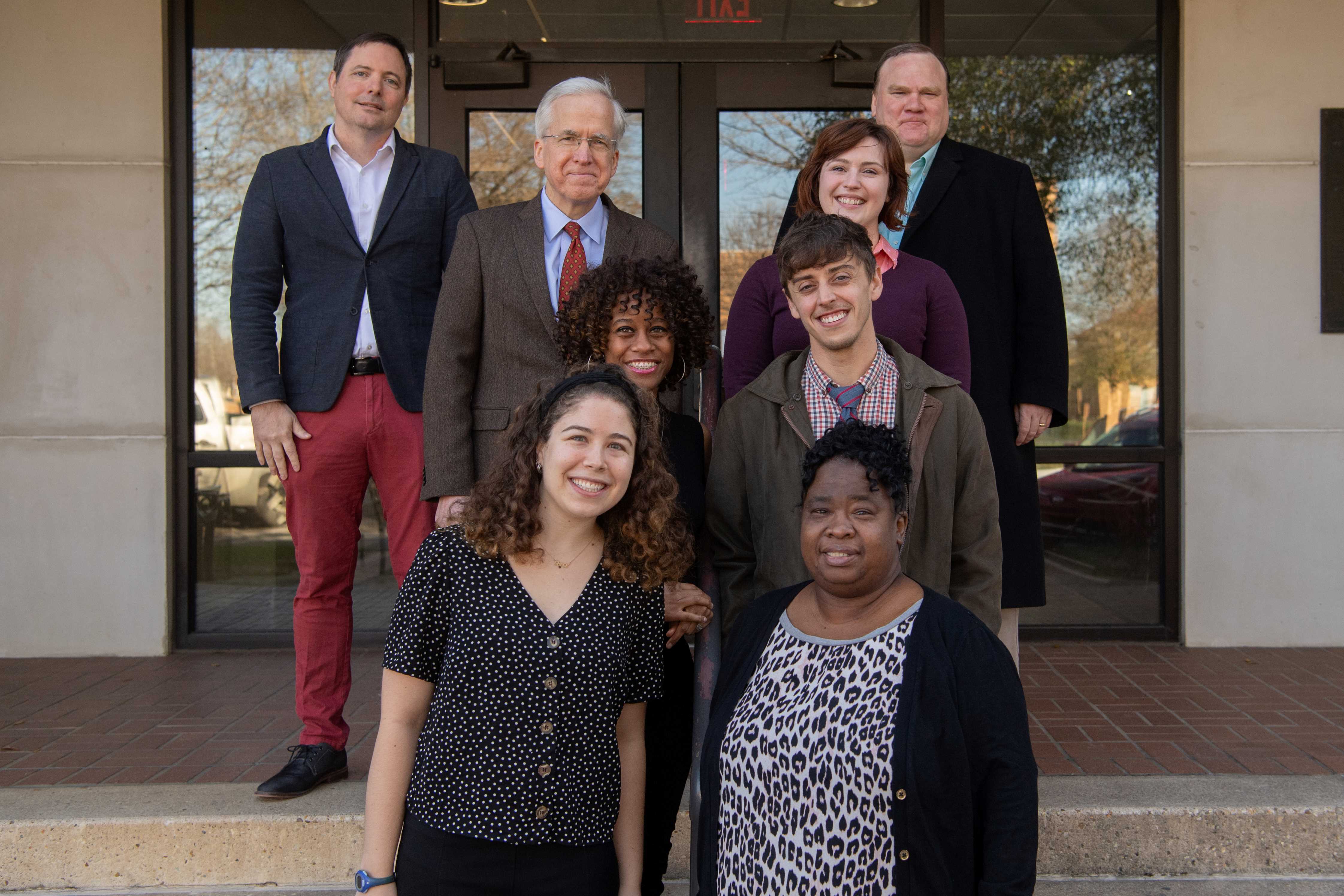 Left to right: first (bottom) row, Lydia DuBois, programming coordinator, Rosedale Freedom Project (RFP), and Lynn Washington, director of operations, RFP; second row, Dr. Nerma Moore, director of development and corporate giving manager, Delta State University Foundation, and Jeremiah Smith, director of programming, RFP; third row, Lloyd Gray, executive director, the Phil Hardin Foundation, and Maia Wegmann, assistant professor of English at Delta State; fourth row, Michael Smith, associate professor of English at DSU; Don Mitchell, associate professor of English at DSU.
Left to right: first (bottom) row, Lydia DuBois, programming coordinator, Rosedale Freedom Project (RFP), and Lynn Washington, director of operations, RFP; second row, Dr. Nerma Moore, director of development and corporate giving manager, Delta State University Foundation, and Jeremiah Smith, director of programming, RFP; third row, Lloyd Gray, executive director, the Phil Hardin Foundation, and Maia Wegmann, assistant professor of English at Delta State; fourth row, Michael Smith, associate professor of English at DSU; Don Mitchell, associate professor of English at DSU.
Delta State University received a $32,100 grant from the Phil Hardin Foundation to fund an initiative in which undergraduate students in a creative writing poetry class and their faculty member from the Division of Languages and Literature will serve as mentors to middle- and high-school students associated with the Rosedale (Miss.) Freedom Project. The affiliation, called The Spoken Word Freedom Project, will begin in fall 2020 and conclude in spring 2021.
“We are grateful for and excited about this opportunity to expand art programming to under-resourced Delta communities,” said Don Allan Mitchell, associate professor of English at Delta State and the campus point person for the alliance. “The Hardin Foundation’s commitment to improving educational opportunities for all Mississippians is vital to the enduring culture of the Delta and we’re honored to engage in this work. This project will allow our students and the Rosedale Freedom Project (RFP) fellows to collaborate in their artistic development and showcase a permanent record of that partnership. RFP Cofounder and Executive Director Jeremiah Smith, Program Coordinator Lydia DuBois, Director of Operations Lynn Washington, and the RFP fellows are doing important work, and I look forward to highlighting their efforts.”
The Spoken Word Freedom Project intends to teach both mentor- and mentee-students about the benefits of the history and use of spoken-word composition and performance. This exploration will take place in workshop settings at DSU and at the LEAD (Love, Action, Education, and Discipline) Center at the Rosedale Freedom Project. Those four principles guide RFP, whose mission is: “Supporting the Mississippi Delta’s young leaders in the development of critical consciousness and the practice of justice through community building, exploration, artistic creation, organizing, and the study of social history and grassroots democracy.”
Participants also will have the opportunity to study and create poetry that might relate to personal experiences or community issues. Their culminating activity will be a spoken-word performance at Delta State’s annual Winning the Race conference that addresses racial healing and equity and social justice. To prepare for that show, scheduled for spring 2021, RFP fellows and their DSU undergraduate counterparts will work with a professional performance artist.
The Phil Hardin Foundation, based in Meridian, Miss., underwrote this joint activity because the endeavor fits its longstanding goal to be “a catalyst for educational opportunity and community improvement in Mississippi,” as the website states. Since being created in 1964, the Hardin Foundation has invested more than $60 million toward strengthening the capacity of its community, region, and state to meet educational challenges.
“We are so thankful to Executive Director Lloyd Gray and the board of directors of the Phil Hardin Foundation for partnering with us on such an important project,” said Dr. Nerma Moore, director of development and corporate giving manager at the DSU Foundation. “Self-expression is an essential part of life and overall growth. When young adults have a chance to express themselves in an environment where they feel safe and believe that their voices are heard, they are generally more active and more productive in society. The Phil Hardin Foundation has supported us for many years, and to be able to re-engage at this time for this new and noteworthy project is truly special.”

